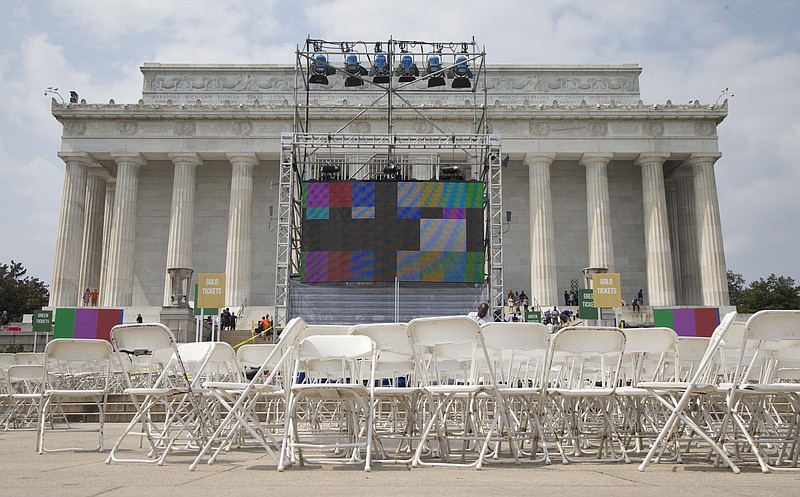In the state where the Ku Klux Klan was born and where civil rights leader Dr. Martin Luther King Jr. was slain, a new report lists Tennessee 10th among the 50 states and the District of Columbia in level of racial integration.
The 2017 rankings are remarkable for one of the 11 states that seceded from the union during the Civil War. Texas and Tennessee are the only two of the 11 in the top 10 of the list. Georgia is 15th and Alabama 25th.
The WalletHub analysis also lists the state as 18th for racial progress over time, but behind eight other Southern states. We hope that indicates the Volunteer State had less progress to make on the issue and not that the progress it has made is ninth among states of the former Confederacy. The analysis doesn't indicate whether either or some of both reasons are true.
While opinions as to the validity of the personal finance website survey are likely to vary, its data sets provide at least a snapshot of where the state is at the exit of one United States president who it was suggested would be the first post-racial president, but hasn't been, and the entrance of another who is feared by some to make race relations even worse.
The WalletHub survey measures the gaps between blacks and whites in 16 key indicators of equality and integration for the 50 states and Washington, D.C., for both racial integration and racial progress.
Tennessee achieved its highest ranking - first - in the integration sector of the survey for voter turnout gap. The results for all states, based on the 2012 presidential election (the most recent election when the survey was made), showed blacks had a larger voter turnout than whites in at least eight states, and the gap was largest in the Volunteer State.
Georgia and Alabama also tied for the top spot in the voter turnout gap.
Tennessee ranked fourth in labor-force participation, meaning the percentage of blacks and whites working was fourth closest in the country. Indeed, according to the Bureau of Labor Statistics, 58.9 percent of blacks in Tennessee were employed in 2015 but only 55.8 percent of whites.
The state was 14th in both the percentage gap between black and white residents with at least a high school diploma and in residents with at least a bachelor's degree.
It ranked 15th for the gap between whites and blacks in median annual income and 16th for the gap in home ownership rate.
Tennessee remained above the national average in the business ownership rate gap and the standardized test scores gap, where it was 21st in both.
The state also was 24th in unemployment rate gap and 25th in poverty rate gap.
But it was below the national average in the gap between blacks and whites in infant mortality. Alabama also was below the national average; in fact, it was in the bottom five of states, meaning its gap in infant mortality between whites and blacks is larger.
Ranked ahead of Tennessee in the overall level of integration between blacks and whites are, respectively, Hawaii, Idaho, Kentucky, Texas, Delaware, Nevada, West Virginia, Oklahoma and Montana.
In the racial progress sector of the survey, among Southern states, the Volunteer State ranked behind Georgia (first), Mississippi (fourth), Texas (eighth), North Carolina (ninth), Louisiana (10th), Alabama (12th), Virginia (14th) and Arkansas (17th).
Tennessee is not listed in the top five or the bottom five of the states and Washington, D.C., in any of the categories of racial progress.
However, Georgia, in achieving its No. 1 listing in the racial progress sector, was third in highest change in median annual income gap, fourth in highest change in business ownership rate gap, and fifth in lowest change in poverty rate gap. Alabama was fourth in the latter category.
The Peach State also was seventh in change in the gap between the percentage of residents with at least a high school diploma and in the change in home ownership gap, eighth in change in the standardized test scores gap, 10th in change in voter turnout gap (based on the 2012 election), 14th in change in the labor force participation gap, and 16th in change in the gap in the percentage of residents with at least a bachelor's degree.
The large and diverse metropolis of Atlanta probably is responsible for most of the changes in the gaps that give the otherwise largely rural state its high ranking.
While racial integration and racial progress in areas that ultimately relate to personal finance are important and critical, we're not sure racial progress in matters of the mind and heart have made such strides. Perhaps we should hope that where we expected to see such progress in the last eight years, but didn't, we will see progress in the same areas over the next four or eight years, when we don't necessarily expect it.
